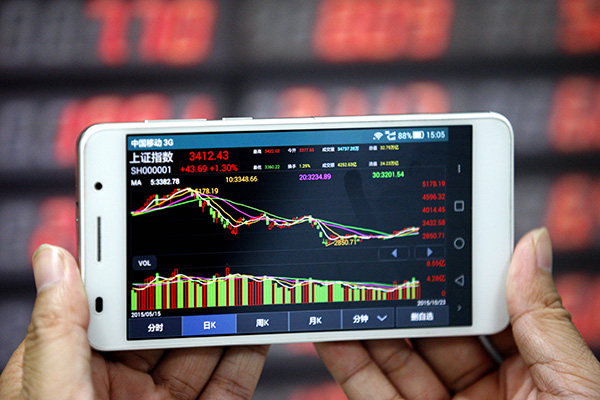 |
|
A stock indicator shows the benchmark Shanghai Composite Index on Oct 24, 2015. [Photo by Xie Zhengyi/Asianewsphoto] |
A-share investors brace for 2015 GDP growth number
The release of a set of China economic data this week will be pivotal to the turbulent A-share market. Investors have been anticipating a fresh reading of GDP growth that could indicate Beijing's future policy direction.
Besides the whole-year GDP number for 2015, key data like growth of industrial output, property and retail sales, and fixed asset investment are scheduled for release this week.
Stock investors have been waiting eagerly for the data in the hope that any better-than-expected data would help relieve last fortnight's market nervousness.
The benchmark Shanghai Composite Index is already down 18 percent this year as investor sentiment has been weighed down by concerns about the acceleration in China's economic slowdown and the significant depreciation of the renminbi.
While the consensus forecast is 6.8-6.9 percent GDP growth in 2015, down from 7.3 percent in 2014, growth this year could further decelerate to as low as 6 percent amid the so-called supply-side reform that emphasizes industrial capacity unwinding and destocking.
The weak economic outlook has prompted some investors to go underweight from overweight on the A-share market.
"The combination of low risk-adjusted returns, an accelerating economic slowdown, the corporate debt build-up, and currency weakness led us to change in our stance on the Chinese equity market," said Alain Bokobza, a strategist at French bank Societe Generale.
Bokobza noted that investors may have priced in high GDP growth for 2015 even though there were signs it would be disappointing. So, the Chinese equity market, particularly onshore stocks, do appear expensive despite the recent correction, he said.
"Clearly, the onshore China equity markets are far more vulnerable to slowing long-term growth expectations. We remain underweight on Chinese assets."
Analysts have been anticipating further easing of both fiscal and monetary policies in response to expectations of slower growth this year.
Further reduction in interest rates and banks' reserve requirement ratios, as well as additional measures to lower corporate costs, are expected to be rolled out, they said.
"The central government noted the need for more flexible monetary policy to facilitate structural reforms and lower business costs, which we think means (lower) interest rates. We forecast a cumulative 50 basis points of PBOC policy rate cuts by mid-year, taking the one-year lending rate to 3.85 percent," Tim Condon, chief Asia economist at ING Bank, said in a research note.
Wendy Liu, chief China strategist at Nomura Securities, said investors have been divided over China's foreign exchange policy and the continued depreciation pressure on the yuan.
In a research note, she said pessimists saw the weak Chinese equity and currency performance as precursors of an economic hard landing or even a financial crisis. But optimists, she noted, are convinced the yuan has performed much better than other emerging market currencies. So China could benefit from a weaker currency just like Japan and Europe.
Nonetheless, uncertainty over China's foreign exchange policy and the deprecation of the yuan will remain major factors that would prevent investors from raising their exposure to the Chinese market, analysts said.
Lu Wenjie, China H-share strategist at UBS AG, said two factors will be key in future: the policy bottomline for the yuan's depreciation and whether the growing risk of debt defaults by Chinese companies can be effectively contained.
"Before the uncertainties are clarified, foreign investors are unlikely to increase holdings in the Chinese market," he said.
